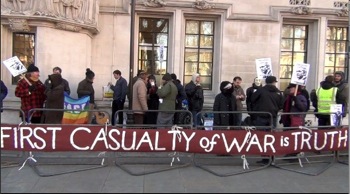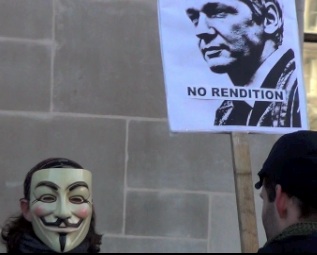Since its 2004 debut, use of the European Arrest Warrant (EAW) has exploded; in those eight years, its flaws have already destroyed or destabilized many lives. Although high-ranking EU officials now admit that the current EAW system is a "threat to human rights," EAW reform may not happen soon enough to prevent it from snaring more victims ... including Julian Assange.
 "Edmond Arapi was tried and convicted in his absence of killing Marcello Miguel Espana Castillo in Genoa, Italy in October 2004. He was given a sentence of 19 years, later reduced to 16 years on appeal. Edmond had no idea that he was wanted for a crime or that the trial even took place. In fact, Edmond hadn't left the UK at all between the years of 2000 to 2006. On 26 October 2004, the day that Marcello Miguel Espana Castillo was murdered in Genoa, Edmond was at work at Café Davide in Trentham, and attending classes to gain a chef's qualification. Edmond was arrested in June 2009 at Gatwick Airport on a European Arrest Warrant (EAW) from Italy, while he was on his way back from a family holiday in Albania. It was the first he knew of the charges against him in Italy ... A British court ordered his extradition on 9 April 2010."
"Edmond Arapi was tried and convicted in his absence of killing Marcello Miguel Espana Castillo in Genoa, Italy in October 2004. He was given a sentence of 19 years, later reduced to 16 years on appeal. Edmond had no idea that he was wanted for a crime or that the trial even took place. In fact, Edmond hadn't left the UK at all between the years of 2000 to 2006. On 26 October 2004, the day that Marcello Miguel Espana Castillo was murdered in Genoa, Edmond was at work at Café Davide in Trentham, and attending classes to gain a chef's qualification. Edmond was arrested in June 2009 at Gatwick Airport on a European Arrest Warrant (EAW) from Italy, while he was on his way back from a family holiday in Albania. It was the first he knew of the charges against him in Italy ... A British court ordered his extradition on 9 April 2010."
Julian Assange has now been detained for 500 days without charge. This includes the 10 days he spent in solitary confinement on top of the 490 days he's spent electronically tagged under house arrest. After all this time the media is still spreading the same falsities about his case and people continue to attack him with the same misconceptions as they were a year and a half ago.
 During the second and final day of the U.K. Supreme Court's hearings on Julian Assange's extradition, Matrix Chambers attorney Clare Montgomery offered her rebuttal to arguments made yesterday by Assange's counsel. (Dinah Rose is representing Assange in his fight against extradition to Sweden for questioning on sex crime allegations.)
During the second and final day of the U.K. Supreme Court's hearings on Julian Assange's extradition, Matrix Chambers attorney Clare Montgomery offered her rebuttal to arguments made yesterday by Assange's counsel. (Dinah Rose is representing Assange in his fight against extradition to Sweden for questioning on sex crime allegations.)
The week's proceedings have highlighted disparities of law among EU countries and the legal challenges involved in reconciling these conflicts. Assange's case may test the extent to which EU nations can maintain their legal autonomy under the rubric of a unified European system. It may also raise the question: to what degree will EU states have to harmonize their conflicting legal regimes in order to avoid this sort of continued legal wrangling in the future?
Montgomery presented Sweden's case against Assange for about four hours, during which time she appeared to reject EU-wide legal standardization -- essentially arguing that respecting state sovereignty requires preserving the status quo. If it agreed with Montgomery's position, the Court would have to accept significant differences among EU nations in implementing EU-wide legal standards. By contrast, Assange's legal team largely took the position that, while allowing for some variation and inconsistency, the Court should mandate certain universal principles in the extradition process, because of the seriousness of the potential risk that extradition may pose to individual rights.
 At Day 1 of the Julian Assange extradition hearing
At Day 1 of the Julian Assange extradition hearing
On the night before the hearing began, one dedicated Assange supporter in London told me that she planned to arrive at Court by 6 a.m., ahead of the throngs that she expected based on the turnout at Assange's hearing last November. No doubt the freezing February temperatures kept large crowds at home this morning; instead of the masses anticipated, there were only a few orderly lines segregated into cameramen, sign-wielding protesters, and the courtroom audience -- a mix of media representatives, Assange faithfuls, and the curious. I was in the latter line, which was also peppered with a few Occupy London luminaries. During the next hour of collective shivering, I met journalists from all over Europe and the U.S., who now braved frigid weather to witness this historic proceeding. Arriving at around 8:30, one hour before the Court opened to the public, I witnessed the expectant crowd devolve into a chorus of complaints as the early-morning, late-winter wind chill robbed our fingers of almost all feeling.
But, mercifully, 9:30 at last arrived -- as did Assange, soon after. The white-haired WikiLeaks founder offered a spirited hello to the crowd and preceded us into the Court.
At the entry, Court staff had handed out a media briefing, which included the following details:
"Issue: Whether a European Arrest Warrant ('EAW') issued by a public prosecutor is a valid Part I EAW issued by a 'judicial authority' for the purpose and within the meaning of sections 2 and 66 of the Extradition Act 2003.
 Bradley Manning moving to Fort Leavenworth
Bradley Manning moving to Fort Leavenworth
'US officials' say private Bradley Manning is being moved to Fort Leavenworth in Kansas according to the Associated Press. An announcement is expected tomorrow at the Pentagon. "The officials spoke on condition of anonymity because the move has not yet been made public."
Fort Leavenworth is home to the United States Disciplinary Barracks, the U.S. military's only maximum-security facility, which houses male service members convicted at court-martial for violations of the Uniform Code of Military Justice. According to Wikipedia, only enlisted prisoners with sentences over five years, commissioned officers, and prisoners convicted of offenses related to national security are confined to the USDB. Manning is still awaiting trial. Midwest Joint Regional Correctional Facility, opened October 5, 2010, is also on the Fort Leavenworth site and may be the one Manning is headed to.
Press briefing at the Pentagon contained the following:
The BBC first announced this morning that the High Court of England and Wales* has listed court dates of 12-13 July to hear Julian Assange's appeal against extradition from the UK to Sweden.
BBC reporter Dominic Hurst tweeted shortly after his first announcement that "Assange's appeal is against Judge Riddle's ruling that extradition to Sweden wouldn't breach his human rights," a summary repeated in this report from the Guardian.
Mark Stephens @markslarks, Assange's UK solicitor, then replied to a first question on Twitter from a WLC reporter: "dates correct. Detail wrong." When questioned further by another WLC reporter hoping for a lawyerly update, he tweeted: "will come when I return to the UK."
There is obviously some time for precising our understanding of what the appeal may entail. Parliamentary review of the European Arrest Warrant (EAW) is also expected in June [citation needed and welcomed].
* NB: Scotland's legal system has always been independent from that of England and Wales.
UK MP quizzes Crown Prosecution Service over Assange extradition case
Liberal Democrat MP Julian Huppert has raised the relevance of the Human Rights Act to the role played by the UK Crown Prosecution Service (CPS) in Sweden's attempt to extradite Julian Assange.
In reply to Mr Huppert's questions during a joint committee hearing on human rights, Keir Starmer, director of Public Prosecutions, admitted that the CPS "are bound by the Human Rights Act, and we are bound by our duties to the court." However, he added that human-rights issues would be for the courts to determine rather than for the CPS.
Impenetrable though those legal distinctions may appear in the abstract, parliamentary attention to possible politicization of law is significant where it appears that the boundaries between law and politics are not clear and stable.
Australian MP and shadow minister reflects on WikiLeaks, Spycatcher, and freedom of the press
Malcolm Turnbull (L-Wentworth), former leader of the Opposition in the Australian House of Representatives and the current shadow minister for Communications and Broadband, spoke to Sydney University Law School on 31 March about his experiences representing former MI5 officer Peter Wright, author of Spycatcher, and about the concerns and responsibilities the Australian government faces relative to Assange's own situation and to WikiLeaks publications generally.
 Debate: This House believes whistleblowers make the world a safer place
Debate: This House believes whistleblowers make the world a safer place
On 9 April, the Frontline Club and the New Statesman will host a public debate in which Julian Assange will speak for the proposition "This House believes whistleblowers make the world a safer place."
The debate will be chaired by Jason Cowley, editor of the New Statesman; other panelists have yet to be announced. The event will be held at Kensington Town Hall at 5 pm GMT; it is already fully booked but should be both livetweeted and filmed.
Rob Stary, Australian lawyer for Julian Assange and WikiLeaks: interview
Last week the WikiLeaks Australian Citizens Alliance (WACA) posted the video of an interview they did with Rob Stary, Julian Assange's lawyer in Australia, before the WikiLeaks Free Speech Forum in Melbourne on 4 February.
Some of the interview focuses on legal and political issues particular to Australia. More generally, however, Stary challenges the claims of a number of governments that their legal manoeuvres against Assange and/or WikiLeaks are unaffected by politics. His analysis of the international interplay between law and politics is a fine summary of the state of play so far.
On 2nd March 2011 at 9.15am a meeting was held, organised by Andrew Laming (Liberal Party MP Bowman Qld) at Parliament House Canberra to allow federal parliamentarians who wished to attend, some insights into the matters of Julian Assange facing extradition from the UK to Sweden, and facing (subject to that extradition process) a possible trial in Sweden and another possible extradition to the USA thereafter.
Among others, MPs Andrew Laming, Malcolm Turnbull, Doug Cameron and Sarah Hanson-Young were in attendance, along with parliamentary staff members.
Three speakers made themselves available for oral presentations and questions: Greg Barns, barrister from Tasmania; former Australian diplomat Tony Kevin and Peter Kemp, solicitor from NSW. The latter two made written material available for the parliamentarians, reprinted below with their permission. Written material was also provided by Jennifer Robinson, UK counsel for the Julian Assange. That material is reprinted with permission here.
After short addresses by each of the three speakers, the meeting was opened for questions and summaries of each speaker in the proceedings appears below, after biographies.
Julian Assange has lost the case at the extradition hearing. Full ruling here in PDF. While this writer expected considerable difficulty for Assange's case on count 4, Chief Magistrate Howard Riddle found all four counts to be extraditable. More on that and his findings for another day.
An important first point is that this extradition finding should not be misinterpreted as some species of proven guilt. Julian Assange is still presumed innocent until proven guilty by a proper trial process. The extradition process and appeals to follow in the UK are not that trial process.
The European Arrest Warrant system is flawed and has again been used by a signatory nation to the Framework Decision 2001 (PDF) without having to prove the strength of the prosecution case.
Paul Stephens, Australian ambassador to Sweden, last week formally requested assurances from Swedish Justice Minister Beatrice Ask concerning the treatment of Julian Assange under Swedish law.
In a letter written on the day of final arguments in Assange's extradition hearing last Friday,
Stephens explained that Assange "has been detained in his absence" by a Swedish court on suspicions of having committed "a criminal offence".
"I wish to convey the Australian Government's expectation that, should Mr. Assange be brought into Swedish jurisdiction, his case would proceed in accordance with due process and the provisions prescribed under Swedish law," the Australian ambassador.
He emphasised as well that he expected Assange's case to adhere to "applicable European and international laws, including relevant human rights norms."
At the final day of the extradition hearing on 11th February 2011 SC Montgomery from the Crown Prosecution Service, acting for the Swedish prosecution authorities, made what this writer considers to be some extraordinary submissions. One of them was directed personally at Robertson and was simply unacceptable, if, and I believe it to be so, that the tweeter @federicacocco correctly recorded it:
Robertson SC has every right to report her to the Bar Council of England and Wales. It was uncalled for and unhelpful to the case and one can’t help thinking of automatic adverse inferences on both counsel and his client, the respondent/defendant Julian Assange which would have been aggravated if there had been a jury involved.
Perhaps I’m wrong and the English bar allows practitioners to insult each other at the bar table in such fashion but I rather doubt it.
The following is a reconstruction of the Julian Assange extradition proceedings on 11 February 2011 based primarily on the tweets of @federicacocco (Federica Cocco) and in much smaller part from the tweets of @channel4news. WL Central acknowledges those sources. The tweets have been preserved as much as possible and combined but are rewritten in parts for clarity, and legal terminology has been inserted where appropriate. Clarifying additions are generally in italics and may be assumptions within the legal context.
SC Robertson’s Submissions.
Robertson QC opens submissions with an account of the attack on Julian Assange by Fredrik Reinfeldt, prime minister of Sweden; Robertson says that Reinfeldt's comments earlier this week amount to his labelling Assange an "enemy of the people" in Sweden.
"This will influence a fair trial,” says Robertson, who quotes the prime minister as claiming that Assange and his lawyers are “sexist and condescending to Sweden."
The Swedish chancellor added to the prime minister's remarks, which Robertson says is an intolerable development; he adds that it is unprecedented for a government minister to comment in that way.
From the Guardian's timeline, rewritten for chronology and with legal terminology:
The hearing opened with Clare Montgomery QC, for the Crown Prosecution Service on behalf of the Swedish authorities. Opening submissions are that the Swedish prosecutor, Marianne Ny, is asserted to be an issuing authority for the purposes of a European Arrest Warrant (EAW).
In relation to the offences, the court decides that the alleged victims are to be called Woman A (three counts of sexual assault alleged) and Woman B (one count of r*pe alleged)
Ms Montgomery says the matters are extraditable offences because the definitions in the two countries are the same. "Mr Assange had sexual intercourse with her and exploited the fact that she was asleep." This is submitted to be an offence under English law. In relation to Woman A there are three counts of sexual assault "without consent" and again contrary to English law.
Julian Assange appears tomorrow, 7 February, at Westminster Magistrates Court for what has been announced as a two-day hearing, but judging from past extradition hearings in the UK, it is likely (with appeals) to take much longer, even a year or more, with the second-last word being that of the Supreme Court (formerly House of Lords) and then, under certain circumstances, the last word from the Home Secretary.
Readers should note that the procedure is not to judge the actual case on its merits as a criminal procedure but to judge it according to relevant sections of the UK Extradition Act. Such evidence of the alleged offences that has surfaced is only relevant indirectly, such as to prosecutorial abuses, not to the arguable merits of that evidence and a future case in Sweden if extradition occurs.
The Skeleton Argumentbegins with a challenge to prosecutor Ms Ny’s authority to issue an European Arrest Warrant (EAW). The case of Enander v. The Swedish National Police Board [2005] EWHC 3036 (Admin) is cited; it states that only the Swedish National Police Board is the authorised authority.
It is not clear from the UK Press Association report why Swedish Prime Minister Fredrik Reinfeldt responded to reporters' questions about Julian Assange in London two days ago by addressing the hypothetical question of Assange's extradition from Sweden to the US, but he didn't dismiss it as hypothetical:
Mr Reinfeldt said Sweden's policy was not to extradite people to countries with the death penalty. But he said Sweden's courts, not its government, would decide that. ...
"We should remember when we ask questions about this that these are legal systems talking to each other, not politicians."
We know from the cables and other sources (see the summary in section 7, 92-96, of the "skeleton" legal argument) that Swedish courts have in the past been complicit in the illegal kidnapping of refugee claimants by US agents. More broadly, the role of diplomacy as mediator between law and politics has arisen repeatedly in many of the cables released by its major media partners and WikiLeaks.
Since the role of the courts is usually to interpret legislation ("policy") or to strike it down if it is unconstitutional, Reinfeldt's apparent failure to affirm Swedish refusal to extradite to countries that retain capital punishment raises questions.
Via @calixte on Twitter
According to Russia Times, Julian Assange has been granted a Russian visa and plans to visit the country soon. With his next court hearing scheduled for February 7, Assange may be able to visit Russia in three weeks, but only if the Swedish extradition request is turned down by Britain.
No details of the agenda and schedule have been disclosed. However, by that time a Russia-based pro-WikiLeaks NGO currently being established is likely to get its official registration.
The Russian News Service quoted by Russia Times quotes Israel Shamir as its source for the article. Shamir is a highly controversial figure who was associated with Wikileaks in distributing the US State cables.
In other news, Moscow Times reports "Russia's Own WikiLeaks Takes Off".
http://wlcentral.org/node/1010/edit
We are indebted to Julian Assange who apparently instructed his counsel to make available the "Skeleton Argument" for the extradition hearing proper.
It was expected, per my previous post Extradition Part 3 that the issue of extradition (and arrest) for the purposes of investigation only, would be a highly significant issue for the extradition arguments, and so it was.
One part of that document however that shocked me, that I have discussed with colleagues (likewise shocked) was paragraph 88, the legal implications of which I was unaware. It now seems that some (or indeed all?) of the prospective charges of a sexual nature in Sweden do not have as a required element that the prosecution must prove (for a conviction to be sustained) the element of mens rea, the "guilty mind" otherwise known as the fault element.
Extradition 3
Backtracking a little from the UK’s Extradition Act (in the Extradition 1 post) it is necessary to understand that the origin of that legislation comes from the European Arrest Warrant (“EAW”) regime in turn based on the Council Framework Decision of 13 June 2002 on the European arrest warrant and the surrender procedures between Member States.(Pdf)
It is also necessary to understand that where interpreting legislation like the UK’s Extradition Act (that will be applied in Assange's hearing) and if finding ambiguity or uncertainty, resort can be made--ordinarily to parliamentry second reading speeches in countries like Australia for example
—to examining, in this case, that very document of the Council Framework Decision.
The Preamble to the Council Framework Decision states in part:
It's taken a while before some detailed information has come to light on the arguments presented by prosecutor and defence at the bail hearing yesterday.
The Telegraph reports:
http://www.telegraph.co.uk/news/worldnews/wikileaks/8202524/WikiLeaks-Ju...
Earlier, during the two hour long hearing, the court was told that the “strength” of the evidence was poor.
His legal team argued that particularly the rape allegation was wrong and if the case was tried in Britain the case would not be classified as such a crime.
This refers or alludes to, apparently, the rape allegation being in the nature of a relatively minor sexual molestation in which case it seems to me, it then doesn't fit within the 12 month European Arrest Warrant system requirement of an offence where the maximum sentence must be 12 months or more for extradition to be valid. If in the UK such an alleged rape evidence was prima facie (on the face of it) low category molestation, per UK law, attracting less than 12 months custodial sentence, then it would not appear to qualify as an extraditable offence.
Theme by Danetsoft and Danang Probo Sayekti inspired by Maksimer